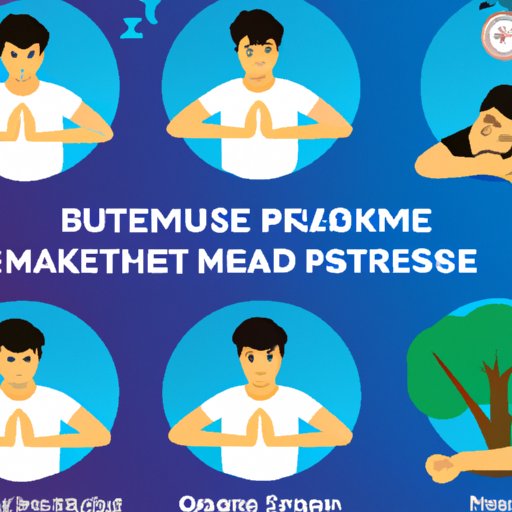Introduction
High blood pressure, also known as hypertension, is a condition in which the force of the blood against the artery walls is too high. It can cause damage to the heart, kidneys, and other organs. Having high blood pressure can also increase the risk of stroke, heart attack, and other serious health issues. If not managed properly, high blood pressure can lead to severe complications and even death.
Try Progressive Muscle Relaxation
Progressive muscle relaxation (PMR) is a technique that involves tensing and relaxing each muscle group in the body in order to reduce physical and mental tension. This technique can help lower blood pressure by calming the body and reducing stress levels.
Benefits of Practicing Progressive Muscle Relaxation: PMR can reduce stress and anxiety, improve sleep quality, and help lower blood pressure. It can also help improve concentration and focus, and boost mood.
How to Practice Progressive Muscle Relaxation: Begin by sitting or lying down in a comfortable position. Starting at your feet, tense each muscle group for 5-10 seconds and then relax for 10-20 seconds. Work your way up the body, tensing and relaxing each muscle group until you reach your head. As you do this, focus on the sensations in your body and take deep, slow breaths. When you’re finished, take a few moments to notice how your body feels.

Reduce Stress Levels with Mindfulness Meditation
Mindfulness meditation is a form of meditation that focuses on being aware of the present moment without judgment. It can help reduce stress and anxiety, which can in turn help lower blood pressure.
Benefits of Practicing Mindfulness Meditation: Mindfulness meditation can help reduce stress, improve focus and concentration, and increase self-awareness. It can also help reduce blood pressure by calming the body and mind.
How to Practice Mindfulness Meditation: Begin by sitting or lying down in a comfortable position. Close your eyes and take a few deep, slow breaths. Focus your attention on your breath, noticing the sensation of air flowing in and out of your body. When your mind wanders, simply bring your attention back to your breath. Continue this practice for 10-20 minutes and when you’re finished, take a few moments to notice how your body feels.

Practice Deep Breathing Exercises Before Bedtime
Deep breathing exercises can help relax the body and reduce stress levels, which can help lower blood pressure.
Benefits of Deep Breathing Exercises: Deep breathing exercises can help reduce stress and anxiety, improve sleep quality, and lower blood pressure. It can also help improve focus and concentration, and boost mood.
How to Practice Deep Breathing Exercises: Begin by sitting or lying down in a comfortable position. Close your eyes and take a few deep, slow breaths. Focus your attention on your breath, noticing the sensation of air flowing in and out of your body. Slowly inhale and exhale, counting to four with each breath. Continue this practice for 5-10 minutes and when you’re finished, take a few moments to notice how your body feels.
Exercise Regularly and Maintain a Healthy Weight
Regular exercise can help lower blood pressure by improving cardiovascular fitness and increasing endorphins, which can help reduce stress levels.
Benefits of Regular Exercise: Regular exercise can help reduce stress, improve sleep quality, and lower blood pressure. It can also help improve concentration and focus, and boost mood.
Tips for Maintaining a Healthy Weight: Eat a balanced diet that includes plenty of fruits and vegetables, lean proteins, and whole grains. Limit processed foods, sugary drinks, and unhealthy fats. Be sure to get enough sleep and drink plenty of water. Lastly, be sure to include regular physical activity into your daily routine.

Avoid Eating Large Meals Late at Night
Eating large meals late at night can cause an increase in blood pressure due to the body’s natural circadian rhythm.
Reasons Why Eating Late at Night Can Increase Blood Pressure: Eating late at night can disrupt the body’s natural circadian rhythm, which can lead to an increase in blood pressure. Eating large meals late at night can also cause indigestion and discomfort, which can further contribute to an increase in blood pressure.
Tips for Avoiding Late-Night Snacking: Try to eat dinner at least two hours before bedtime. Avoid eating large meals late at night, and opt for lighter snacks such as fresh fruit or yogurt. If you feel hungry late at night, try drinking a glass of water or herbal tea instead.
Conclusion
Lowering your blood pressure while sleeping is possible with the right lifestyle changes. By practicing progressive muscle relaxation, mindfulness meditation, deep breathing exercises, and exercising regularly and maintaining a healthy weight, you can reduce stress levels and improve your overall health. Additionally, avoiding eating large meals late at night can help keep your blood pressure in check. Remember, small steps can go a long way towards better health.


